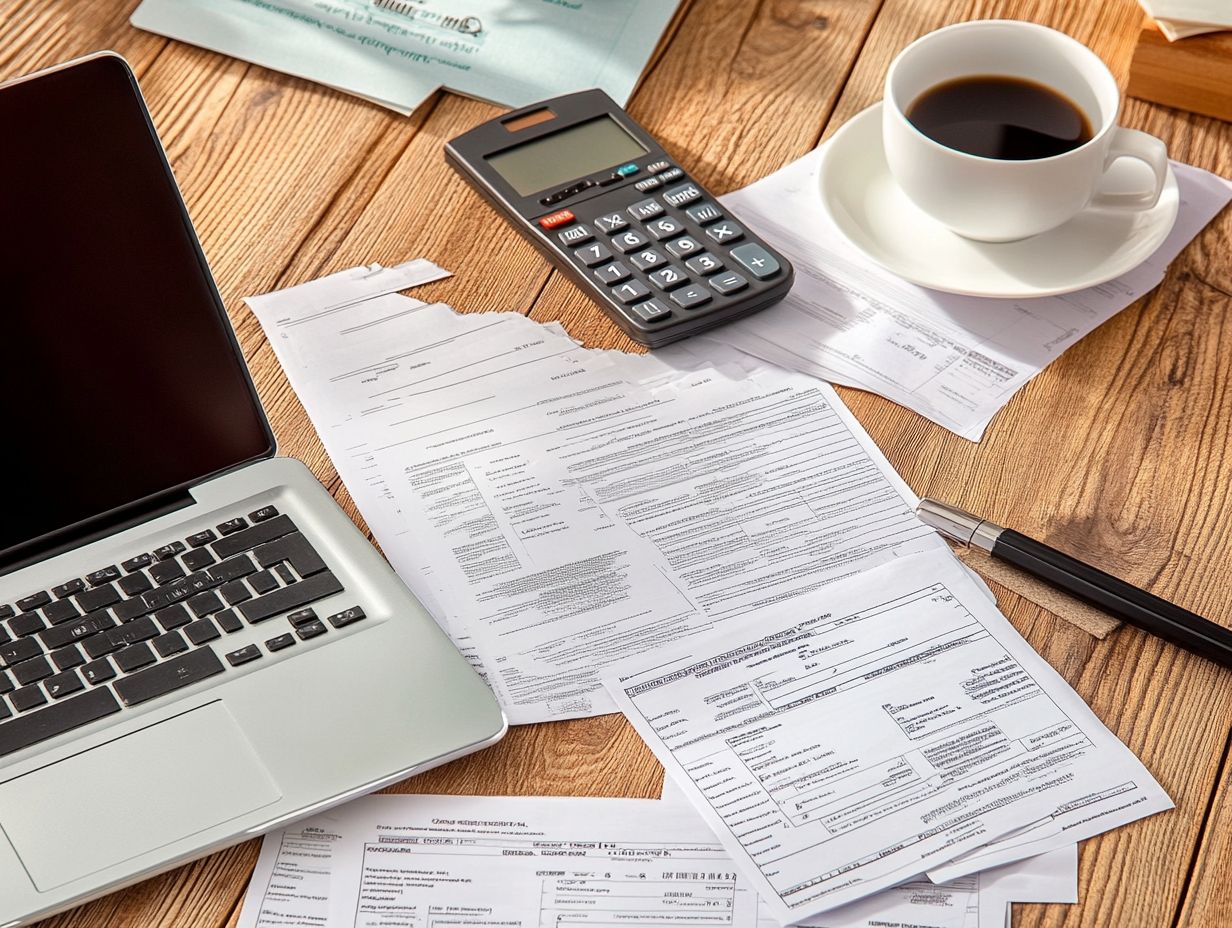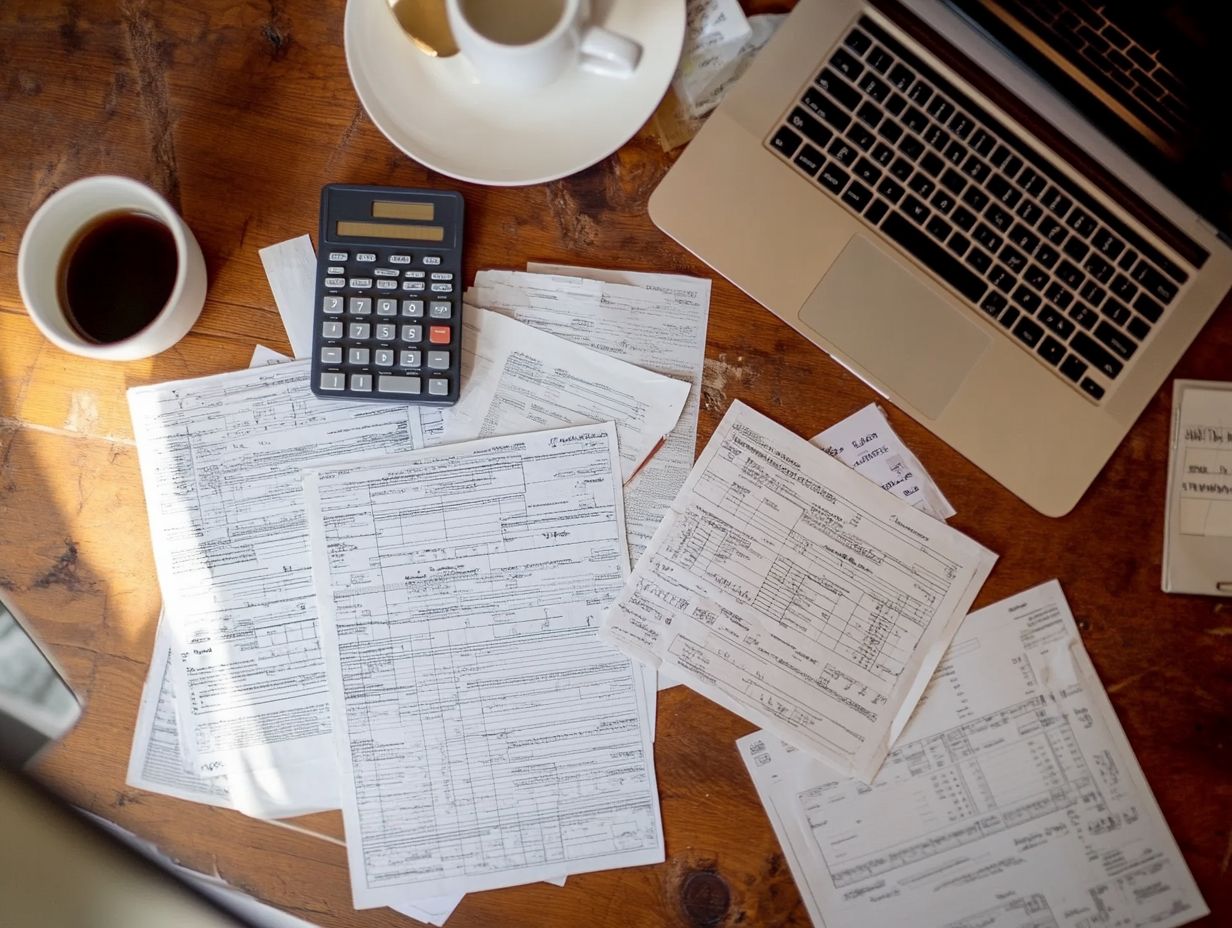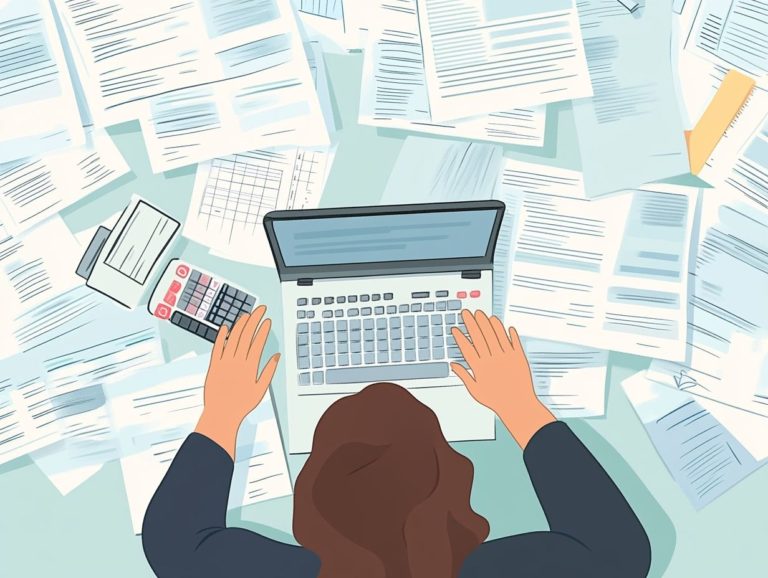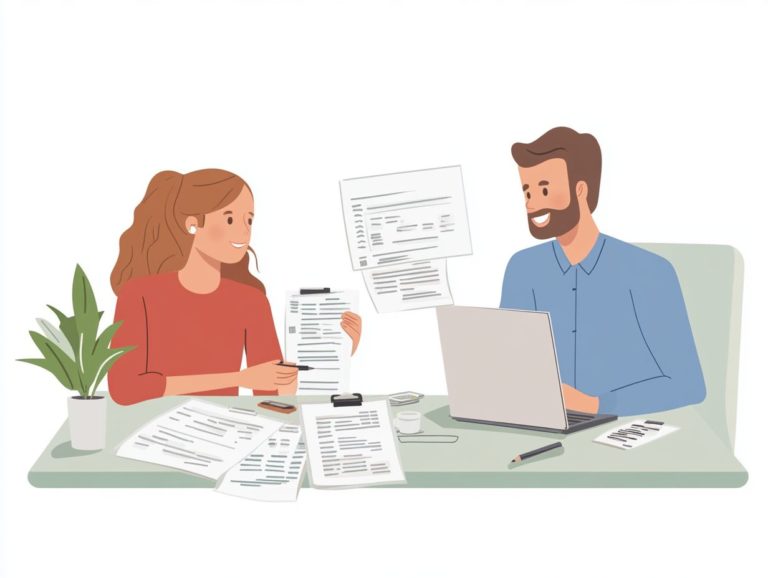Understanding Tax Forms for Freelancers
Freelancing offers flexibility and freedom. However, it also comes with tax responsibilities you must not ignore. Understanding how to manage your business effectively is crucial.
You need to understand the taxes you must pay and the forms to file. This knowledge helps you stay compliant and maximize deductions. This guide will walk you through essential tax forms, such as Form 1099 and Schedule C, while shedding light on common deductions like home office and travel expenses.
You ll find tips for organizing your finances. Learn about different business structures like Limited Liability Companies (LLCs) and S-corps, and consider working with a tax professional. Stay informed to make tax season manageable. This approach helps you maintain financial stability and seize growth opportunities.
Contents
Key Takeaways:

- Freelancers are responsible for paying self-employment taxes, federal income taxes, and state income taxes. Understanding these obligations is essential for effective reporting.
- Understanding the different tax forms, such as Form 1099 and Schedule C, is crucial for accurately reporting contractors’ income and deductions.
- Some common deductions for freelancers include home office expenses and business travel expenses. Keep detailed records and receipts to claim these deductions.
What Taxes Do Freelancers Need to Pay?
Freelancers navigate a distinct financial landscape, balancing numerous responsibilities that encompass a thorough understanding of their tax obligations, which differ notably from those of traditional employees.
As independent contractors, you carry the weight of taxes you pay as an independent worker, income taxes, and potentially state taxes. It s crucial for you to grasp the reporting requirements mandated by the IRS, including strategies for managing your income and payments from clients efficiently.
By doing so, you not only ensure compliance with the law, but also maximize your potential deductions, setting yourself up for financial success.
Understanding Different Tax Forms
Navigating tax forms can be tricky, but it s essential for success! Key forms you need to familiarize yourself with include the 1099, Schedule C, and Form 1040-ES, each playing a distinct role in the tax reporting process.
By mastering these forms, you ll be enabled to manage your income from multiple clients efficiently and optimize your allowable deductions and credits.
Form 1099
Form 1099 is an essential document for freelancers, serving as a formal way to report income received from clients throughout the tax year. As an independent contractor, you will receive a 1099 from clients who have paid you $600 or more, and it s crucial to ensure this income is accurately reported on your tax returns. Grasping the implications of this form is vital for effective income reporting and fully leveraging potential deductions.
Neglecting to report this income can lead to penalties, making it imperative for you to maintain precise records. When you complete your tax returns, be sure to include all 1099 income on Schedule C to calculate your net income accurately. Additionally, tracking and categorizing your business expenses like office supplies or software subscriptions can lead to valuable deductions that lower your taxable income.
Consider setting aside a percentage of each payment for estimated taxes, which can alleviate the stress of looming tax bills. By effectively navigating quarterly taxes as a freelancer, you not only ensure compliance but also enhance your financial stability and open doors to growth opportunities.
Schedule C

Schedule C is an essential tax form for freelancers, enabling you to report your income and claim deductions for business-related expenses incurred throughout the tax year. This form allows you to detail your profits and losses, giving the IRS a clear view of your business s financial landscape.
Knowing how to fill out Schedule C effectively can significantly impact your tax obligations and potential refunds. By outlining allowable deductions, you can maximize your savings.
Here are some common deductions:
- Home Office Expenses: You can account for a portion of your rent or mortgage, utilities, and internet costs, as long as your workspace is dedicated solely to business activities.
- Business Travel Expenses: This includes transportation, lodging, and meals that help reduce your overall taxable income.
To ensure compliance with IRS regulations, it s crucial to maintain thorough documentation and receipts for all claimed expenses. This not only protects you against audits but also enhances the legitimacy of your filings.
This approach helps lower your tax bill. It also encourages you to think positively about your finances year-round.
Form 1040-ES
Form 1040-ES is your go-to tool for calculating and paying estimated taxes throughout the year. This form is essential for freelancers, helping you avoid penalties and manage your tax obligations effectively. As a self-employed individual, you’ll likely need to make quarterly tax payments based on your expected income, making it crucial for maintaining financial order.
Navigating the world of taxes can feel overwhelming, especially when your income fluctuates. By accurately estimating your tax payments using Form 1040-ES, you can steer clear of underpayment penalties that often arise from miscalculating your obligations.
It’s vital to set aside funds regularly consider using a dedicated savings account. This way, you have the necessary amount ready when tax deadlines loom. To improve your financial forecasting, consistently tracking your income and expenses will provide clearer insights into your cash flow.
By implementing these strategies, you can maintain a healthier financial outlook and avoid the last-minute scramble when tax time arrives.
Common Deductions for Freelancers
Freelancers can significantly reduce their tax liabilities by familiarizing themselves with various deductions. Deductions lower your taxable income by recognizing essential business-related expenses.
Here are some deductions freelancers should consider:
- Home Office Expenses: Costs related to your workspace.
- Travel for Business Purposes: Expenses incurred while traveling for work.
- Supplies and Equipment: Items necessary for your business.
- Professional Services: Fees paid to accountants or consultants.
By thoughtfully leveraging these deductions, freelancers can optimize their tax savings while remaining compliant with IRS regulations, ultimately paving the way for enhanced financial growth.
Home Office Expenses
Home office expenses rank among the most valuable deductions available to freelancers. This enables you to claim a portion of your home-related costs as legitimate business expenses. To qualify for this deduction, it s crucial that your home office space is used solely for business purposes, in accordance with the rules set by the Internal Revenue Service (IRS). Understanding the requirements and calculation methods for claiming these expenses can lead to significant tax savings.
To accurately determine the deductible amount, you must calculate the space used for your office in relation to the overall area of your home. This calculation allows you to deduct a portion of your utilities, internet, and even home insurance. For example, if your home office occupies 200 square feet in a 1,000 square foot home, you could potentially deduct 20% of the related home expenses. Alternatively, you might choose the IRS’s simplified method, which allows for a flat rate per square foot of home office space.
Keep in mind that keeping detailed records is vital; maintaining receipts and detailed logs of all expenses is essential to substantiate your claims during tax season. Here are some eligible expenses you can claim:
- Furniture purchases
- Office supplies
- A portion of mortgage interest or rent
Stay organized and informed to unlock the full potential of your home office deductions!
Business Travel Expenses

Business travel expenses offer you a valuable opportunity to lower your taxable income through strategic deductions. When you travel for business, expenses like transportation, lodging, and meals can often be claimed, as long as they align with IRS criteria for business-related expenses. Knowing how to document and claim these costs can significantly enhance your financial management as an independent contractor.
In terms of deductions, remember that meals can be deducted at 50% of their total cost if they are directly related to your business activities. It’s also wise to keep detailed records of entertainment expenses, ensuring each one is clearly tied to a business purpose.
This highlights the need for a well-structured itinerary that outlines the purpose of each activity during your trip. Effective record-keeping practices involve saving receipts, providing a clear narrative for each expense, and categorizing them appropriately.
Adopting this meticulous approach not only streamlines your tax preparation but also ensures compliance with tax regulations, ultimately supporting your financial health and long-term sustainability.
Tax Preparation Tips for Freelancers
Master your tax preparation to empower your freelancing journey! Effective tax preparation is essential for freelancers, as it guarantees compliance with IRS regulations and elevates financial management while reducing stress during tax season.
By adopting organized accounting practices and meticulously maintaining accurate records of income and expenses, you can streamline your tax preparation process.
Using tax preparation software can lighten the compliance load significantly and enhance overall efficiency, allowing you to focus on what truly matters in your business.
Organizing Your Finances
Organizing your finances is an essential step for you as a freelancer, enabling you to effectively manage your income and expenses throughout the year. By adopting a structured approach to financial management tracking invoices, payments, and deductible expenses you can significantly enhance your tax preparation efforts and maintain a sense of order.
Leveraging accounting software can simplify this process, making it easier for you to keep an eye on your financial health.
Moreover, keeping detailed records of every transaction fosters transparency and accountability, which are vital for the success of any freelancing endeavor. Setting aside a specific portion of your income for taxes not only eases the burden at year-end but also cultivates a proactive financial mindset and aligns with best practices for managing income from freelancing.
By regularly reconciling bank statements and utilizing automation features in your accounting tools, you can reduce errors and reclaim precious time. Embrace these strategies to see your financial picture brighten and your profitability soar as tax deadlines approach!
Working with a Tax Professional
Collaborating with a tax professional can be immensely beneficial for you as a freelancer. They offer specialized knowledge and guidance on complex tax issues and compliance requirements.
These experts help you navigate self-employment taxes, deductions, and effective tax planning strategies, ensuring you’re fully prepared for the tax season. This partnership often results in better tax returns and potential refunds, significantly enhancing your financial management.
A knowledgeable expert helps you maximize deductions. This includes home office expenses and travel costs you might overlook.
The experience of a tax professional is invaluable in maintaining compliance with tax laws, minimizing your risk of audits or penalties.
When selecting the right tax advisor, consider their familiarity with freelance operations and a proven track record of success. Staying informed about tax regulations enables you to make informed decisions and fosters a proactive approach to your financial health.
It leaves you better prepared for future tax obligations.
Frequently Asked Questions

What are tax forms for freelancers?
Tax forms for freelancers are documents used to report income and expenses for tax purposes. They help freelancers calculate the taxes they owe and file accurately.
Do all freelancers need to file tax forms?
Yes, all freelancers must file tax forms if they earn more than a certain amount. This amount varies based on factors like filing status and income type.
What is the most common tax form for freelancers?
The most common tax form for freelancers is Form 1099-MISC. This form is used to report non-employee compensation from clients and other types of income, such as rent and royalties.
Can freelancers deduct expenses on their tax forms?
Yes, freelancers can deduct business expenses on their tax forms to reduce taxable income. These expenses must be necessary and ordinary for their business.
Are there different tax forms for different types of freelancers?
Yes, there are different tax forms for different types of freelancers. For example, a sole proprietor would use Schedule C to report income and expenses, while a corporation would use Form 1120.
When should freelancers file their tax forms?
Freelancers should file their tax forms by the annual tax deadline, typically April 15th. However, they may also need to make quarterly estimated tax payments throughout the year if they expect to owe more than a certain amount in taxes.






